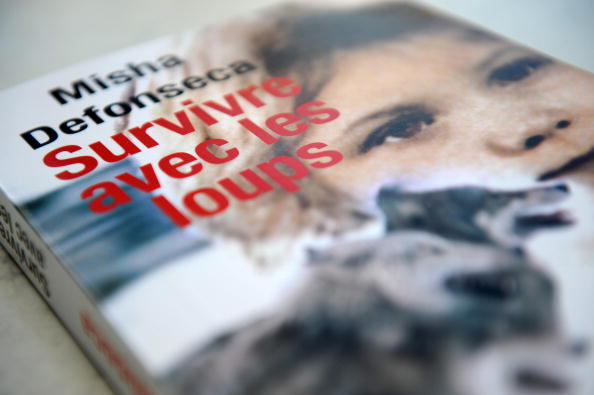Books
This Woman Made Up Her Entire Holocaust Memoir
There exists a long a storied history of people making things up in their memoirs, from the 18th century Maria Monk writing about murderous nuns in a convent she never stayed in, to James Frey who fabricated much of his supposed struggle with addiction in A Million Little Pieces. However, a new case of a woman who completely made up her entire memoir about surviving the Holocaust might just put all other fake memoirs to shame. And the most outrageous part? It turns out she's not even Jewish.
Misha Defonseca's "memoir" Misha: A Mémoire of the Holocaust Years was published in 1997, and described Defonseca's dangerous journey by foot across much of Europe after her parents were arrested and put in concentration camps when she was seven. During the course of the four-year trip, the memoir claims Defonseca walked 1,900 miles, lived for a while with wolves, and killed a Nazi rapist. However, during a lawsuit Defonseca filed against her publishing company a year after the book came out, Defonseca's editor Jane Daniel began to discover inconsistencies in the story.
Daniel began investigating and eventually uncovered Defonseca's original birth certificate, which revealed her maiden name was not Levy, as she'd claimed, but De Wael, that she had been born not Misha but Monica. She was not Jewish, and though her parents were arrested by the Nazis, she herself was cared for by other relatives during World War II. In fact, during the time she claimed to be trekking through the wilderness and bonding with a wolf pack she was actually just attending school in Brussels.
In other words, my faith in humanity has hit a new low point today. And the fact that she's being forced to return some of the money she's made only helps a little.
There are some things that people just should not do, and pretending to be a survivor of genocide is one of them. It not only makes you an awful person, but it is also a slap in the face to real survivors of genocide. The Holocaust is not some rousing story that other people get to insert themselves into because it seems heroic or inspiring.
The Holocaust, like all genocides was horrific, devastating, and monstrous. The fact that some survivors did manage to tell their stories in ways that affirmed life and not death is a testimony to the incredible strength of those people, not some inherently inspiring quality of the Holocaust. Wanting to insert yourself into the Holocaust without having to experience the actual trauma of the experience is deluded and self-centered. Actually profiting from pretending to have been a genocide survivor is unconscionable.

Because ultimately that's what we're talking about here. Defonseca, now 76, says that the events in the "memoir" were part of a fantasy she indulged in as a child when her parents arrest made her "feel Jewish," and that she had trouble distinguishing fantasy from reality. But the harsh realities of genocide are not gray areas (and shouldn't be up for debate), and "feel[ing] Jewish" is not the same thing as being Jewish, particularly during a time when such an identity was a death sentence. Defonseca appropriated the historical narrative of the Holocaust and used it to make money. She profited off the deaths of six million people.
The Holocaust, and all genocides, are blight on humanity's collective history. They are monstrous events that should be remembered for their horror and their devastating impact. They are not political buzzwords or opportunities to cash in.
